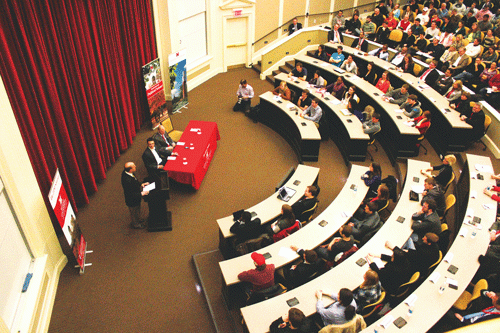
Ari Fleischer engages the audience during the JANUS Forum. Fleischer is a former White House Press Secretary for the Bush Administration and is now a political analyst for CNN. Fleischer discussed democracy in America with Washington Post journalist Ezra Klein. (Kyle Haden | The Miami Student)
Miami University students engaged in a political dialogue about democracy in the United States with two major political figures, Washington Post writer Ezra Klein and former White House Press Secretary Ari Fleischer. The conversation took place at the first JANUS Forum Wednesday Feb. 6.
The two speakers gave a presentation on the question "Is democracy working" for 20 minutes and then answered questions related to the topic that were posed by students at the forum.
One of the organizers behind the event, graduate student, Tyler Sinclair said the success of the JANUS Forum exceeded his expectations.
"I'm very very pleased with how everything turned out," Sinclair said.
Sinclair expected close to 300 students and was surprised to see a packed Taylor Auditorium.
Senior political science major Peter Dougherty said he was also impressed by the level of student interest.
"The best part about it was seeing how interested students were in it," Dougherty said. "The fact that people were standing in the back of the room shows that this is the sort of thing that Miami wants."
Sinclair hopes to see the same level of interest moving forward.
"I'm looking forward to continuing to sustain this type of dialogue on campus," Sinclair said. "I'm glad to see that students appreciate this type of political discourse and I hope that they continue to turn out to events like this."
Klein won a coin toss before the event and he deferred to Fleischer to give the first presentation.
Enjoy what you're reading?
Signup for our newsletter
Fleischer began his presentation by revealing that he was raised a liberal democrat. Fleischer's father was interviewed about his son's change in political parties.
"He said it was better that I became a Republican than a drug dealer but not by much," Fleischer said.
Fleischer argued that democracy works because there is a peaceful exchange of power between political parties. He said the United States experienced a peaceful exchange of power when the Supreme Court had to issue a ruling in 2000, which confirmed that former president George W. Bush had won the election over former vice president Al Gore. Fleischer said just as this transfer of power between political parties was peaceful, so was the first exchange of power between John Adams and Thomas Jefferson.
Klein mentioned in his presentation that a peaceful exchange of power is a low standard in which to judge that democracy is working, and that though the system has improved over the years, it does not mean it is perfect.
"We do not have a perfectly democratic system," Klein said. "The fact that it is much more democratic than it once was does not make it democratic."
Fleischer argued that democracy is working in the way that people want it to work because they are the ones who elect their government.
"The American people keep choosing of their own free will to have a divided government, a government that they themselves vote for instead of choosing the united one."
In contrast, Klein said he felt the American people's say in their government is limited.
"We do not have a particularly democratic system," Klein said. "It is not being very smooth in translating the majority's wishes into law by design."
Fleischer said that democracy can and always should be trusted.
"We had inherently a self-correcting democracy, and we always have and we always will," Fleischer said. "It is rough, it is noisy it is bumpy, but it always eventually gets things just enough right."
Klein protested that democracy's immortality cannot be relied upon.
He concluded by saying it's the people's responsibility to keep it alive.
"So is American democracy working? I'm not actually sure, but I am positive that we have to keep making sure it does function," Klein said.
Fleischer asked something different of the audience.
"The youth vote has become a key, gigantic strength in American politics," Fleischer said. "So, my advice to all of you-if you're wondering about our democracy, if you're wondering about what your role should be-your role should be to dive in. It works, and it only works to the degree that people with good will decide to participate in it."
During the question and answer period students peppered Klein and Fleischer with questions about party compromise, gerrymandering, filibustering, deadlock, voter suppression, culture of political parties and career politicians.
Dougherty said he likes that the students were able to question the speakers.
"It's something you always want to do but you never actually get the chance to," Dougherty said.




